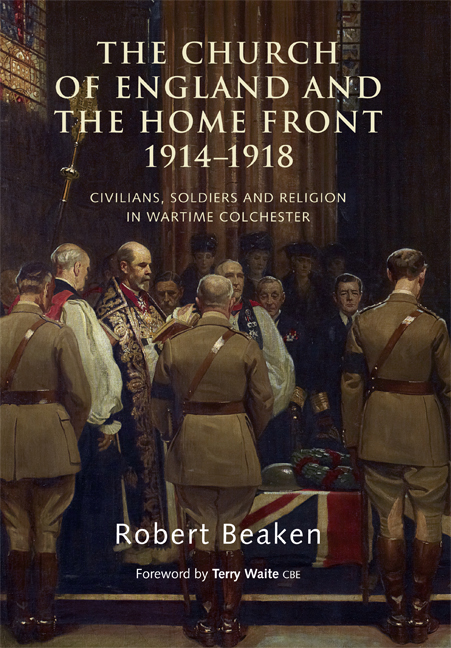 The Church of England and the Home Front, 1914-1918
The Church of England and the Home Front, 1914-1918 Book contents
- Frontmatter
- Dedication
- Contents
- List of Illustrations
- Foreword
- Author’s Acknowledgements
- 1 The First World War – One Hundred Years On
- 2 Colchester
- 3 Wartime
- 4 The Clergy
- 5 The Laity
- 6 Prayer and Worship
- 7 The National Mission of Repentance and Hope
- 8 Thought and Attitudes
- 9 Armistice, Remembrance and Aftermath
- 10 The Church of England and the First World War
- Bibliography
- Index
10 - The Church of England and the First World War
Published online by Cambridge University Press: 11 May 2021
- Frontmatter
- Dedication
- Contents
- List of Illustrations
- Foreword
- Author’s Acknowledgements
- 1 The First World War – One Hundred Years On
- 2 Colchester
- 3 Wartime
- 4 The Clergy
- 5 The Laity
- 6 Prayer and Worship
- 7 The National Mission of Repentance and Hope
- 8 Thought and Attitudes
- 9 Armistice, Remembrance and Aftermath
- 10 The Church of England and the First World War
- Bibliography
- Index
Summary
It is commonly claimed that the Church of England had a ‘bad’ First World War, and a rather ‘better’ Second World War. Adrian Hastings, for example, wrote in A History of English Christianity 1920–2000:
There was no genuine religious revival during the [First World] war nor after the war, nor was there a pastoral or theological revival – though these things were sought for, and even claimed to be coming, at the time. The war unleashed bewilderment and hate, and the churches had done very little to help with either. By the end of the war many were sorry enough for the simplistic clerical bellicosity of the early months. What in retrospect did it really matter? Christianity already appeared to have lost the intellectual battle well before the First World War began. What the war did was to shatter its social and political role as well: to unveil the truth to high and low alike of ecclesiastical near-irrelevance.
The First World War historian Michael Snape has observed:
The war that spawned in the national psyche the sense of a lost generation, an abiding anger at the supposed incompetence of the chateau generals and an ultimate vision of the suffering and futility of war, has also inspired a distinctly negative perception of Anglican army chaplaincy. This perception holds that, while the Church of England acted as a cheerleader for the war, and was thus complicit in wholesale slaughter, the influence of its chaplains on those in uniform was woefully slight … These perceptions, like so much of the popular memory of the First World War, owe far more to literary contrivance than they do to fact.
If it were possible to return to Colchester on the evening of 11 November 1918, and to tell the Anglican clergy and laity – and the tens of thousands of troops who had passed through their churches and parish clubs between 1914–18, or to whom they had ministered in the town's hospitals – that the Church of England had experienced a ‘bad’ First World War and had become a near-irrelevance, they would have had great difficulty reconciling that claim with their own experience and would simply not have believed it.
- Type
- Chapter
- Information
- The Church of England and the Home Front, 1914-1918Civilians, Soldiers and Religion in Wartime Colchester, pp. 233 - 250Publisher: Boydell & BrewerPrint publication year: 2015


